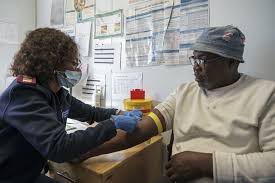
Local and regional production of diagnostics is a priority for WHO as it can strengthen diagnostic capacity, enhance pandemic preparedness and increase access to essential health tools where they are most needed. Partners such as PEPFAR have set ambitious targets to procure 15 million African-manufactured HIV tests by 2025, and this timely addition of a packaging and shipping site marks a significant step toward achieving that goal.
The product, developed by SD Biosensor under the brand STANDARD Q HIV 1/2 Ab 3-Line Test, is now approved to be packaged in Nigeria by Colexa Biosensor Ltd./Codix Pharma Group. With the existing product already available or in use across several African countries, including in Nigeria, many countries are well positioned to adopt and use this regional version. WHO and the Global Fund will also be assisting countries in adopting this test, as well as other regionally manufactured and/or packaged products when they obtain approvals. This will be done through rapid verification studies under the Next Generation Marketing Strategic Initiative which focuses on creating a sustainable diagnostics market in low- and middle-income countries and expanding access to regionally produced diagnostics.
"An estimated 630 000 people die from HIV-related causes, and 1.3 million people acquire HIV annually, the majority of which are in Africa. This addition of a packaging and shipping site increases access to safe diagnostics options, which is key to ending HIV as a global health threat and will also help contribute to greater sustainability of the response," said Dr Meg Doherty, Director of WHO's Global HIV, Hepatitis and Sexually Transmitted Infections Programmes.
WHO's prequalification programme for in vitro diagnostics plays a pivotal role in global health by ensuring diagnostic tools meet high standards of quality, safety, and performance. "The availability of a WHO-prequalified, African-packaged HIV test for professional use provides low- and middle-income countries with affordable, quality-assured testing options, essential for achieving the global 95-95-95 HIV testing, treatment and viral suppression targets," said Dr Rogério Gaspar, Director of WHO's Department of Regulation and Prequalification.
WHO remains committed to assessing additional regionally manufactured products, supporting evidence-based implementation, and expanding diagnostic options to meet global health needs.





